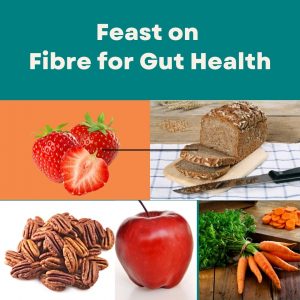Feast On Fibre
by Tracey on March 23, 2023Fibre – we hear so much about eating carbs, fats and proteins, that fibre hardly gets a mention if at all. The foundation of gut health is a regular intake of fibre. Considered a fourth macronutrient because of its importance in keeping both our gut and digestive tract operating at optimum levels. Eating our daily recommended amount can help prevent constipation, reduce the risk of bowel cancer and avoid diverticulitis. According to BBC Food, a staggering 90% of the adult UK population just isn’t consuming enough.
So what is Fibre and what does it do?
There are two types of fibre insoluble and soluble, both of which cannot be digested and are only found in plant foods.
Insoluble Fibre – because it does not dissolve in water. Prevents constipation, haemorrhoids and IBS.
Soluble fibre – water soluble helps control our blood sugar levels by slowing the absorption of sugar and fats.
The main Functions of fibre are:
- Delay glucose absorption into the blood
- Provides food for the good bacteria in the intestine
- Lowers blood cholesterol
- Delays the emptying of the stomach
Our bodies need a minimum of 24g per day, 36g if we experience constipation. The current average intake in the UK is around 13g per day – half the recommended amount.
PS: eating foods high in fibre makes you feel fuller for longer curbing hunger as it can stay in the stomach for up to 2 hours.
Examples of fibre you can easily include daily. Try swapping ‘white’ foods for ‘brown’ foods.
Breakfast:
- Weetabix x 2 = 4g
- All Bran 6 tbsp = 10.3g
- Shredded Wheat x 2 = 3.9g
Lunch:
- Wholemeal Bread x 2 slices = 4.2g
- Whole-wheat Pasta 230g = 8.1g
- 1 Mango = 4.9g
Dinner
- Jacket Potato Medium (180g) = 4.9g
- Baked Beans 200g = 7.4g
- Butter Beans = 8g
Sign up to the newsletter
I will send you special offers and the latest skin care news.

